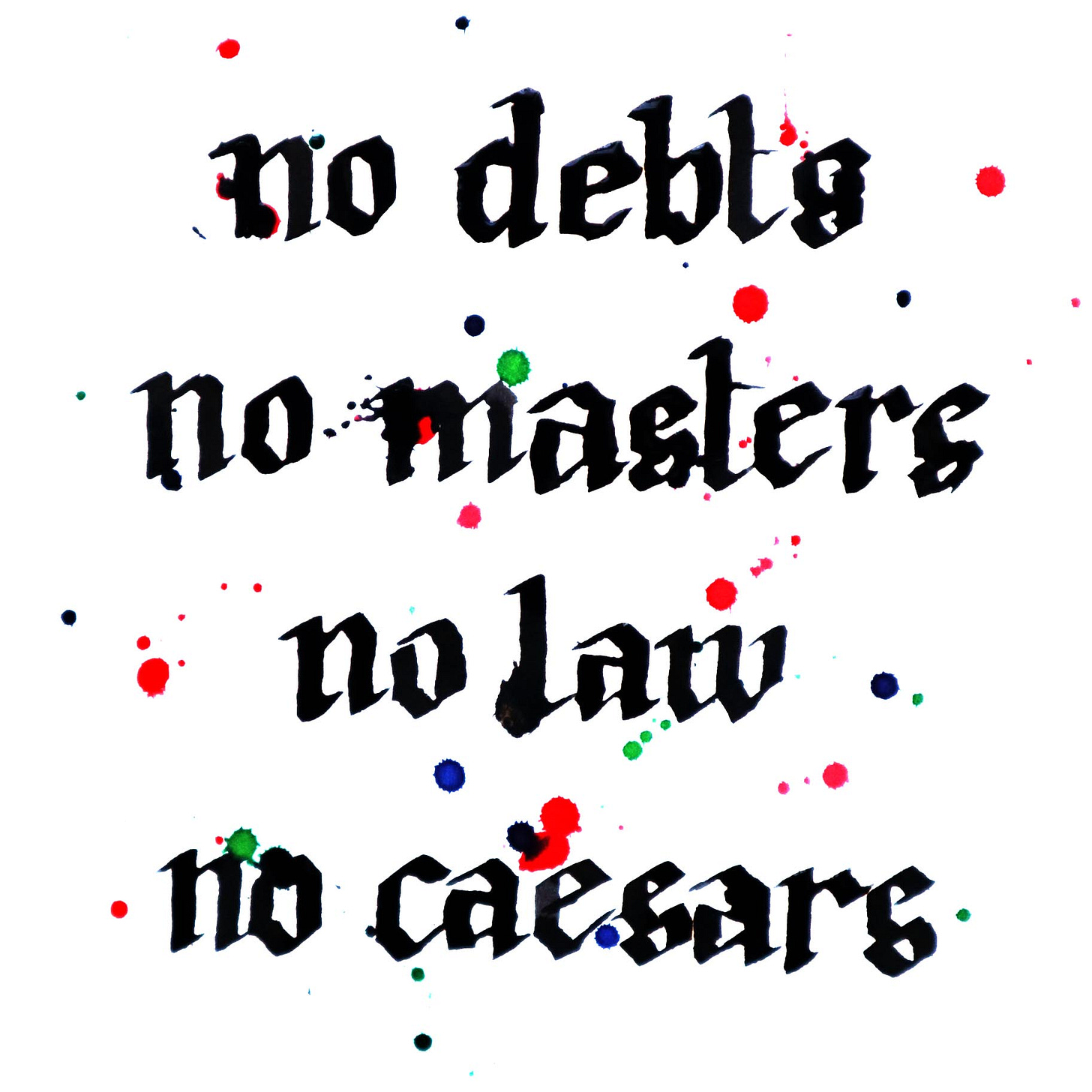When I think about the economic realities in which I live, when I am disturbed and I rail against them, I find myself sliding into a kind of madness. I feel like I’m trying to eat a mountain with a knife and fork. This is partly because the reality is so vast and so real and so powerful and immoveable. It laughs at me. And on the other hand it's all so ghostly and immaterial, a shared fiction from which everything hangs by the neck. It is as absurdly true as it always has been: nobody eats money. Even so, it's the one thing we all believe in.
In the interest of keeping myself, I find it helpful to stand a little to the side, and to find reference points in other times and stories, and to think from some other ground. Let's imagine, for example, that we have left all the ties and trappings of the economies that entangle us in their world-eating trajectories. Let's imagine that we find ourselves in some wild place, learning how to subsist as a group. As an economy emerges between us and the land, what kind of practices might we keep? How might we do things differently?
In the Jewish lore that came to them in the wilderness after their liberation from slavery, it is held that, “every seventh year you shall grant a remission of debts.” Imagine how quickly this practice would collapse the world. It says that every seven years, debts should be canceled “because YHWH's remission has been proclaimed.” This, no doubt, is what Jesus has in mind when he prays, forgive us our debts as we forgive our debtors. God keeps no debts. We keep no debts. It’s not a metaphor. This was economic policy in the lore of Moses.
This ancient discourse on the canceling of debts runs into a related subject: the freeing of slaves. This too was to be done every seven years. The two are connected because debt was the common precursor to slavery. If a person found themselves “falling into difficulty,” as it says, they would be obliged to borrow. If they couldn't repay, then they themselves would become the property of their creditor. Debt was a power relation, in which one class gained increasing power and control over another. This is still the case. It always has been.
On the other hand, since it's true that we often find ourselves falling into difficulty, the lore of Moses, with its self-correcting twists and turns, calls it a moral obligation to lend to a person in need: a moral obligation and not a financial opportunity. Lenders were not permitted to charge interest, and any outstanding debt was to be canceled on the seventh year. Lenders, in fact, had nothing to gain besides the joy of life together; they were being rescued by their neighbors into the greater web of life, from their isolating prisons of private interests.
The lore of Moses is an otherworldly thing. It’s full of things so sensible they would ruin an unjust world, alongside others that seem strange and arbitrary, and others that are quite disturbing. A community of slaves escape their old masters and find themselves in the desert, wondering, how shall we live now? Well, they weren't going to become slaves again, or allow themselves to be divided by a widening wealth gap into one class of owners and another class of indebted human resources.
I’m told it is strongly doubted that any society ever managed to live by these visions. Maybe that's true, or maybe it isn't. In any case, it certainly feels safer to keep them at a realistic distance.
At the end of Fight Club, Edward Norton's character finds, to his own surprise, that he has blown up all the financial buildings in the city and caused the total leveling of financial records. There’s a messianic image here: the event that interrupts all power relations. A eucatastrophe. He could never have done this in his right mind. It was only possible because his unhinged alter ego had taken over. In a world of iniquitous shared fictions, a touch of madness becomes necessary for liberation.
Today we can't, with sanity, look indifferently upon the disparity and chaos and drudgery spiraling out of our economics of accumulation and debt. But to imagine anything different will involve a little madness. A window into an ancient lore given by a god atop a burning mountain.





I wrote recently that conscience is a harsh master. Comfort is a master too though. Our society ensures it. I am not fully self-sufficient. I don't always eschew access to the accumulations of power/capital so easy to peruse on our supermarket shelves. And the months during which I do live from my own resources often feel like an act of madness.
This inversion has required the effort of a panoramic and unilateral marketing machine though. Hiding the beauty, belonging and meaning of real existence - to light a fire for heat, to sacrifice a life for meat - takes an all-encompassing attack on our senses.
But it also takes our consent.
Comfort is our consent. We are able to withdraw it.
Just to say I can't tell you how much I appreciate this post and these comment threads today. I woke up having turned 52, and immediately had the phrase 'a year of forgiveness of debt' in my head, after prayer, seemingly from nowhere.
5 hours later this is all making more sense.